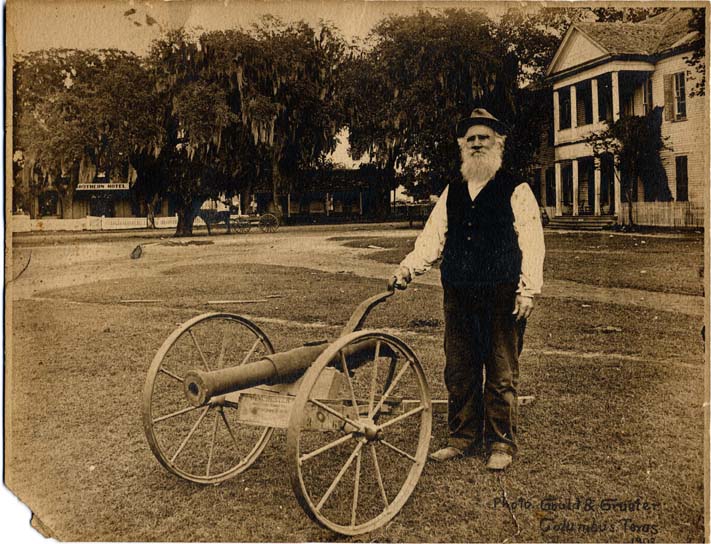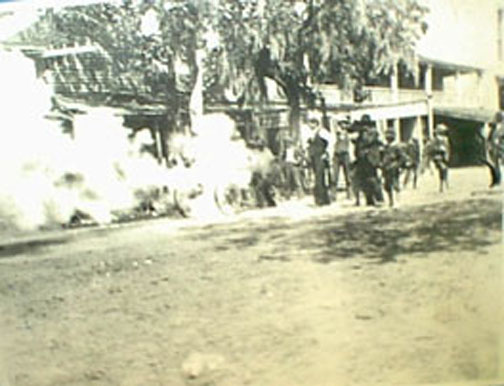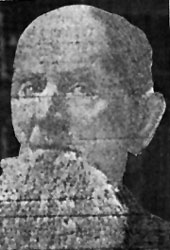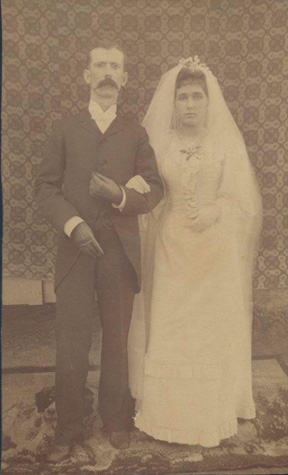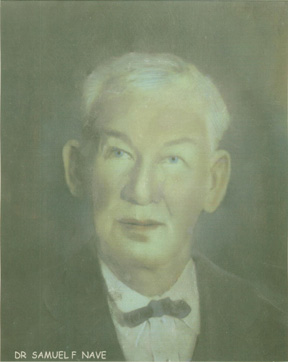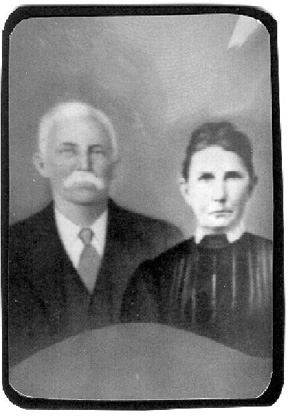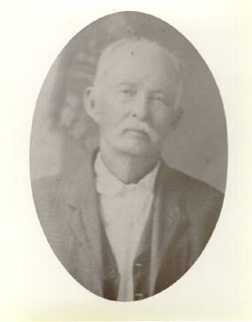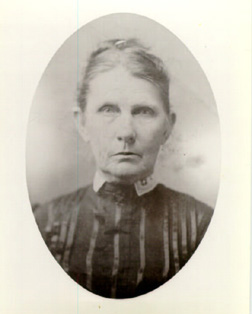Remembers The Black Hawk War.
A citizen of Galveston, now 86, was then about 10 years of age.
TELLS OF HIS EXPERIENCES
Shod Henry Clay's Horse -Dined General Houston - Reminiscences
Living at 2122 K. with his daughter and son-in-law Mr. & Mrs. R. G. Calhoun, is Mike Nave, who still bears the scar of a painful wound received during the days of the Black Hawk War. As those who lived in those thrilling and eventful days are growing fewer in number with each recurring year, a few incidents illustrative of and connected with those stirring days in the "Wild and Wooly West" as they were evolved and reflected from the memory of this interesting and venerable man, will be interesting.
This old gentleman comes down to the present generation bearing the heat and the cold, the sunshine and shadows, and the joys and sorrows of a fraction more than four score and six years. One 22nd day of June 1822, he first saw the light of day in Montgomery County, Ohio, near the town of Dayton. His father, with whom he worked until after he had reached man's estate, was a blacksmith. Naturally, he adopted the trade of his father. In the year 1832 an old man of the neighborhood, popularly known as "Old Man Billy Waggerman" desired to go to his relatives, who were living on the Wabash about 125 or 130 miles from the home of young Nave near Dayton, and Mike Nave was appointed to convey him to his destination. But let Mr. Nave tell the story in his own interesting way:
"In those days Ohio was a new state and the people were inured to a rough and rugged life. Their ways of living and modes of travel were of that crude and unique character incident to the wild and perilous times met and encountered in western frontier life and civilization. In those days the blacksmith shop was an indispensable institution in every town, neighborhood and community. Every blacksmith shop also had a woodworks shop in connection with it. We had to make almost every implement and piece of furniture necessary to supply the needs and comforts of a frontier settlement, such as plows, hoes, plowstocks, wagons, carts, benches chairs and bedsteads. Some of these old articles of furniture would be quite a curiosity today. In those primitive days newspapers were scarce and expensive, and were old before they reached us, and besides we had but little time for reading if we got one. When a smith labored hard at the forge or anvil making plows or wagons or other useful articles, he always went home in the evening with weary limbs, a keen appetite and a desire for sleep. Distances were not considered as it became necessary to travel from one place to another. We became accustomed to feel at home in any place it mattered little whether that place was on the road, in the forest, or on some barge or raft floating on the bosom of some wild stream in that country where the paths and footprints of civilized man were still fresh and scarce."
"But when Old Man Billy Waggerman had to be sent to his relatives and friends in the Walbash, it fell to my lot to take him there. The distance was about 125 miles and I was a right smart chunk of a boy, about 10 years old, but in those days that wasn't considered much of an undertaking for a boy of my age. As I said before, that was not a newspaper age in my country, and the people knew but little what was going on in that part of the world, which was not embraced within the immediate boundaries of their neighborhood. If peace reigned at home, the presumption was that it reigned everywhere else."
"So under the impression that harmony and peace were prevailing among all mankind, Old Man Waggerman and myself set out for the Wabash colony. Our journey was unattended with incident worth of not until we were about 30 miles for our destination. When we began to see huts and fences burned, and other evidence of Indian warfare and depredation. Soon we met a small squad of scouting soldiers. They informed us that the Black Hawk War was on and we were hurried to a fort on the river, the stream making two sides, and hewn logs making the other two. This fortification embraced about 5 acres. All the women, children and old men with provisions, some milk cows, and a few old mares and colts were left in it for protection. The able bodied men had gone to war. The soldiers impressed my horses and left me there until the war was over. Every day the milk cows were belled and let out to graze around the fort. One day they wondered off farther than usual. In the afternoon I could hear the bells in a point of timber about a mile from the fort. I mounted an old race mare with halter instead of a bridle, just before entering the timber this old animal, that had once been stolen by the Indians, later recaptured from them, began to snort, hold her head high and protest against going any farther in that direction. As I was unaccustomed to Indian ways, warfare, ceremonies in greeting and receiving the "pale face" while they were plumed in feathers and wore war paint, I did not understand the conduct of my old race horse. While sitting carelessly on the heroine of many racetracks, an arrow whizzed over my head. As I turned to see where it had come from, the old mare nearly jumped from under me and wheeling, it seemed to me never could have made better time on any race track than she made that spot to the fort. Upon entering the fort, I found an arrow had pierced her flesh around the girth and was still buried in the flesh. In passing into her flesh, it had inflicted an ugly wound in my leg, from which I suffered more of less about 65 years before it healed entirely."
"After this war ended I returned to my home near Dayton, making the trip alert and in 4 days. Here I worked with my father at his trade until several years after I became of age"
|
"From Dayton, I went to Kentucky where I established a blacksmith shop on the _____________about 6 miles from Lexington. From here I again returned to (someplace in Ohio - was illegible), and after living there 3 years I came to Texas with my family."
MIXED UP IN KENTUCKY FEUD
"While in Kentucky interceding as a sort of peacemaker in a neighborhood quarrel, I became involved in what become known as the "Crain War". After about a weeks fighting and scrimmaging between the two factions, our side forced the Crain faction to seek refuge and barricade themselves in an old hewn log building. We borrowed a cannon and ammunition from the home of the late Col. Meade, and opened a bombardment on the Crain fortress. As soon as we knocked the rood from the building, the Crain forces hoisted the white flag and treated for peace. A treaty of peace being agreed upon, our foes gave bond for the faithful observance of the terms and stipulations contained in the treaty. No lives were lost in this neighborhood war. Shortly after this I took passage on a steamer with my family for Texas, passing down the Ohio and Mississippi rivers to New Orleans and thence to Galveston."
SHOD HENRY CLAY'S HORSE:
"I should have stated that while working at my trade in Lexington, I had the honor to shoe the horse of the great Henry Clay. This was during his race against James K. Polk for the presidency. He was on his way to a bit barbeque at Nicklesville. He held the horse and talked with me while I performed the work. This is one of the jobs the memory of which I have always cherished. On that memorable day the turnpike was lined with buggies, carts, carriages, wagons, horseback riders and footmen, all going to hear the great Kentuckian thrill the multitude with his magnetic eloquence and words of wisdom. And truly they were not disappointed. At that barbeque I saw Tom Marshall, Crittenden, Lesley Combes, John C. Breckenridge and other great men of Kentucky."
ARRIVES IN GALVESTON:
"But returning to my arrival in Galveston. From here I went up the Brazos River in a steamboat to San Felipe. This was in 1852. The boat proceeded up the river but was wrecked after leaving San Felipe. From there I went by wagon to Colorado County, where I again pursued my trade as a blacksmith until Civil
War. I found blacksmithing in those days just about the same in Texas as it had been in Ohio and Kentucky. It was a hard was to earn a living in either state. When the Civil War broke out I joined a militia regiment and did service on the Sabine until the final surrender. I was in the skirmish in which the confederated succeeded in capturing the Yankee boat Sachem. At one time myself and a comrade were given furloughs. When I was returning I had to go by Richmond, where we had to cross the Brazos River on a ferryboat. We had prepared a good supply of rations to take back to camp with us. We had chicken, ham, corn bread and other good things. When we reached the middle of the river the ropes broke or became entangled, and seeing that it would be an hour or more before we could be landed, my comrade and I decided to eat dinner. There were two elegant ladies and a venerable and imposing looking gentleman also on board. As we spread our lunch, I heard one of the ladies say in a low voice "Oh, how I would relish a piece of that chicken." I immediately invited them to share the meal with us. She proved to be Mrs. Houston and she informed us the old gentleman was her husband, Gen. Sam Houston. The general and ladies accepted the invitation and all dined together upon the ferry boat chatting pleasantly as we dispatched our dinner."
SHOT INDIANS ACROSS THE FLODED RIVER:
"I should have told you about my experience in an Indian chase shortly after I came to Colorado, County. A party of us organized a posse and pursued them as far as the Guadalupe River. It was a cold rainy time and when we reached that stream it was booming and about 300 yards wide and impassable, but there were the Indians and the stolen horses on the opposite bank. Our shots could not reach them and in broken English say to us "No understandee" Finally one old man named Jack Cryer, who had a rifle on the order of the Davy Crockett pattern said he would speak to them in a language the could understand, and so, putting in an extra large charge of powder and a ball with tight patching, and with the eye of a skillful marksman, he made the proper calculation and fired. The Indians understood the language of this old fusee. At it's crack, and Indian was heard to scream and jump and twist himself into contortions of pain and agony. In a few seconds, it seems to me, the Indians had broken camp and were out of sight with their stolen horses and plunder. This was the last raid into Colorado County."
|
WERE HELD UP ON STAGE COACH:
"After I returned from the Civil War I again returned to and followed my old trade for many years. Finally, I got the job of shoeing horses on the stage line from San Antonio to Fort Concho. I used to make regular trips over the line on stage. On one occasion, after returning from Fort Concho with the stage driver, John Chadwell, we were held up three miles from Menardville. It was a cold frosty night and we saw a bright blazing fire on the side of the road and men standing around it. We thought nothing of this until Winchesters were thrown upon us and we were ordered to get out and come to the fire to warm. The driver was also requested tin a tone of one exercising authority to bring those sacks with brass locks. This John did without serious or stubborn protest. The sacks were ripped open and all their letters and packages were carefully searched for money and valuables under the glare of the blazing and crackling fire. After my first scare had passed and I felt that we would not be hurt, I remarked to John while gazing into the barrel of the Winchester, "Well, John this office of delivery has been established since we passed last." Fore this piece of pleasantry the robber who had me in charge gave me a jab on the head with his gun and replied, "Yes, we have established it for our special benefit and convenience, and you be careful how you use your tongue, or we will establish a graveyard in connection with it for you're sort." I needed no further invitation to hold my tongue, and I still carry a scar on my head as a relic of that night's experience. The next trip I made we were held up near the same place. We were marched about 100 yards from the road into the chaparral and there the scoundrels broke our lamps and left us in the dark, and it was sleeting. Fortunately the driver, who was a cigarette smoker, had some matches and got a fire started, and we managed to take care of the ladies until morning, when we could see how to hitch up our team and continue our journey. The robbers knew us and I knew them and our turn came next to get even.
TURN TABLES ON ROBBERS:
"The stage owners furnished us, John Chadwell and myself with money and we stayed around Menardville two weeks or longer, drinking and playing billiards and carousing with the very men who had robbed us until we got them all located. Everything being ready and all the parties implicated in the robbery being properly located and identified, tried in U. S Court and convicted. One went to the penitentiary for 4 years and three went for 20 years each."
"After the arrest, trial and conviction, it was not altogether safe and healthy for the witnesses and officers who had been connected with the prosecution of these robbers. The sheriff, while sitting in this house reading one night, received three loads of buckshot in his body. Two of the deputies or witnesses met death in a similar manner, and from the same source. Not knowing how soon Chadwell and myself would receive attention from the friends of these outlaws, I said to him that the climate of Menardville was not conductive to happiness, continued good health and long life, so far as we were concerned. And that we had better make ourselves scarce thereabouts, for awhile at least, and so we left. I do not know what became of John, but I went to San Antonio and remained there, until finally I decided to return to my home near Weimar."
"In the early settlement of Texas, and in fact until years after the Civil War, there was money in shoeing horses, especially if you could get a job of keeping the state horses shod. But after many years of laborious work at the forge and anvil, hammering iron into plows, wagon tires and such like, I decided I wanted some special work in my line on a salaried position. Well, the facts that suggested these desires were these; I was about 58 years old (1880) my children were all practically grown, and my wife was severely afflicted with rheumatism, and the doctors horse was nearly always at the gate and my house smelled very much like an apothecary's shop. Under these circumstances I decided to break up housekeeping and let my wife live with my married daughter. So I got employment and began by shoeing horses for a certain part of the stage line, going from San Antonio to Fort Concho on a salary of $50.00 per month. After a while one of the horseshoers at one of the stations complained that he must have another route because they gave him brown sugar in his coffee. The boss of the line told him it was a pity that he had to drink brown sugar sweetened coffee, and that matters would be arranged so that he would not have to do so. "Take this paper to the paymaster, said the boss; he will see that you get your pay, and then you see that yo9u get another job so that you will not have to use brown sugar in your coffee." That job was given to Pap Nave I then received $75.00 per month, and then another job developed and was added to my work increasing my salary to $100.00. I was permitted to do any extra work that came to me that did not interfere with my employment. I was also given free passage over the line, and every six weeks I was granted a furlough of one week to visit my family, and I always reached home with cash rattling and jingling in my pocket."
The old gentle man when feeling well and in the humor for talking loves to dwell upon those bygone days, and it is interesting to hear him relate his many experiences and incidents of pioneer years. On one occasion his wife was sick and he was permitted to go home and remain 6 weeks without any docking of wages. He says that his wife, who had been long a sufferer with rheumatism, was struck by lightening, which broke her leg and affected a permanent cure of the rheumatism. Later he was struck in the leg by the same element, but he experienced a different affect, suffering a partial paralysis, from which he has never entirely recovered.
But finally the railroads came and knocked him and his employers out of their jobs, and he again returned to his farmhouse near Weimar, then to the home of his daughter and son-in-law.
In this conversation it is evident that the appreciation of his employers, attested by the kind and liberal treatment of him, will remain among some of the brightest and most cherished memories of his lone and eventful life.
|
